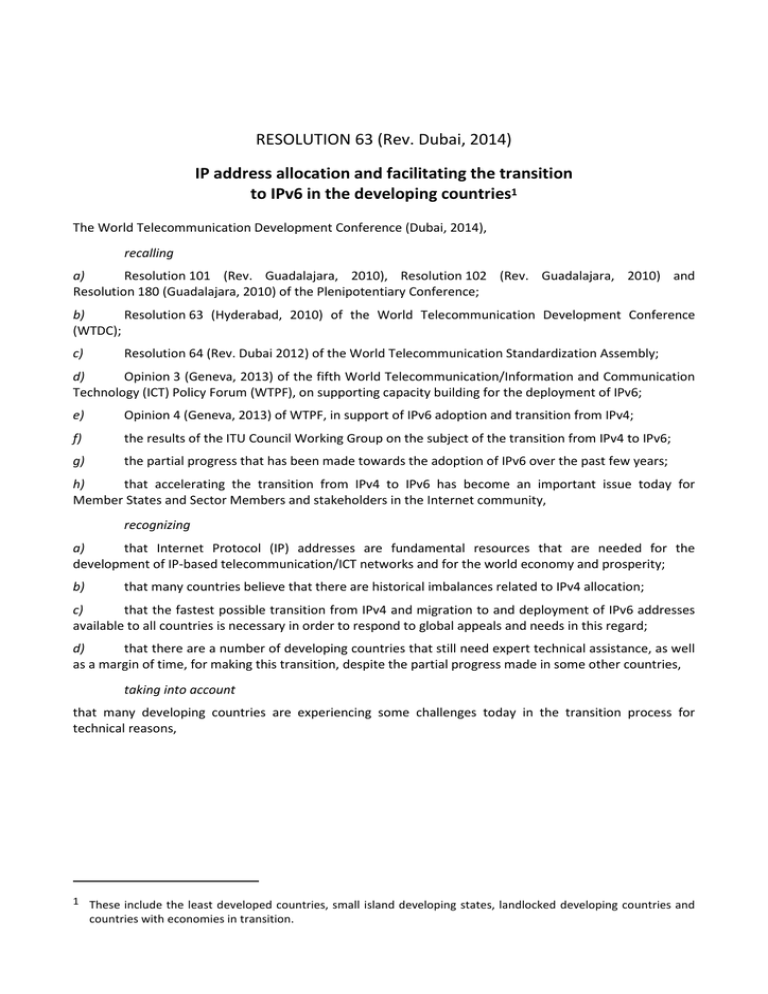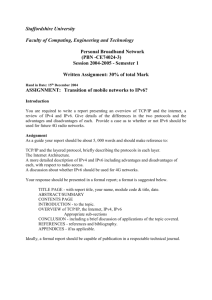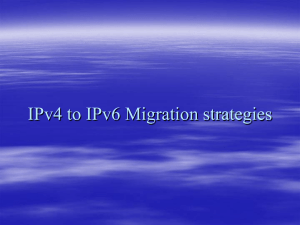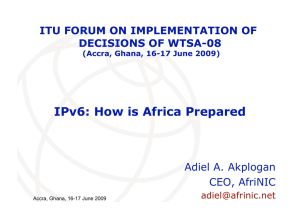RESOLUTION 63 (Rev. Dubai, 2014) to IPv6 in the developing countries
advertisement

RESOLUTION 63 (Rev. Dubai, 2014) IP address allocation and facilitating the transition to IPv6 in the developing countries1 The World Telecommunication Development Conference (Dubai, 2014), recalling a) Resolution 101 (Rev. Guadalajara, 2010), Resolution 102 (Rev. Guadalajara, 2010) and Resolution 180 (Guadalajara, 2010) of the Plenipotentiary Conference; b) Resolution 63 (Hyderabad, 2010) of the World Telecommunication Development Conference (WTDC); c) Resolution 64 (Rev. Dubai 2012) of the World Telecommunication Standardization Assembly; d) Opinion 3 (Geneva, 2013) of the fifth World Telecommunication/Information and Communication Technology (ICT) Policy Forum (WTPF), on supporting capacity building for the deployment of IPv6; e) Opinion 4 (Geneva, 2013) of WTPF, in support of IPv6 adoption and transition from IPv4; f) the results of the ITU Council Working Group on the subject of the transition from IPv4 to IPv6; g) the partial progress that has been made towards the adoption of IPv6 over the past few years; h) that accelerating the transition from IPv4 to IPv6 has become an important issue today for Member States and Sector Members and stakeholders in the Internet community, recognizing a) that Internet Protocol (IP) addresses are fundamental resources that are needed for the development of IP-based telecommunication/ICT networks and for the world economy and prosperity; b) that many countries believe that there are historical imbalances related to IPv4 allocation; c) that the fastest possible transition from IPv4 and migration to and deployment of IPv6 addresses available to all countries is necessary in order to respond to global appeals and needs in this regard; d) that there are a number of developing countries that still need expert technical assistance, as well as a margin of time, for making this transition, despite the partial progress made in some other countries, taking into account that many developing countries are experiencing some challenges today in the transition process for technical reasons, 1 These include the least developed countries, small island developing states, landlocked developing countries and countries with economies in transition. resolves to promote the exchange of experiences and information relating to the adoption of IPv6, with the aim of unifying joint efforts of all stakeholders and ensuring the contributions that enhance the Union's efforts to support this transition, instructs the Director of the Telecommunication Development Bureau 1 to continue the close cooperation and coordination with the Director of the Telecommunication Standardization Bureau in this regard, and especially the continuation of ongoing activities to facilitate the process of raising awareness on IPv6 transition and deployment among all members, and to provide the necessary information on training activities; 2 to cooperate with relevant organizations on capacity building for IPv6 in order to respond to the needs of developing countries; 3 to submit an annual report to the ITU Council on the progress made in this regard, and report to the next WTDC; 4 to develop guidelines, to enable adjustment of the organizational frameworks and policies necessary for migration to and deployment of IPv6, invites Member States 1 to coordinate and inventory, if necessary, the IP addresses in use within their respective territories for the purposes of evaluation, development and monitoring; 2 to continue to stimulate and encourage the transition to IPv6, and particularly to encourage national initiatives and increase interaction with government and private-sector entities, academia and civil-society organizations in order to exchange experiences, expertise and knowledge; 3 to encourage the training of technicians and administrators from governmental agencies and private-sector organizations in IPv6 network, with theory and labs that show how to implement IPv6 on their networks; 4 IPv6; to raise awareness among providers on the importance of making their services available over 5 to encourage manufacturers to supply to the market customer premises equipment (CPEs) that support IPv6 support in addition to IPv4; 6 to foster cooperation among ISPs, service providers and other relevant stakeholders to shorten the transition period.





